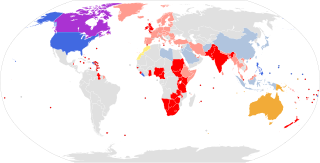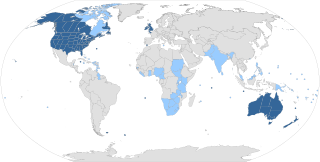American English, sometimes called United States English or U.S. English, is the set of varieties of the English language native to the United States. English is the most widely spoken language in the United States and in most circumstances is the de facto common language used in government, education, and commerce. Since the 20th century, American English has become the most influential form of English worldwide.

A dictionary is a listing of lexemes from the lexicon of one or more specific languages, often arranged alphabetically, which may include information on definitions, usage, etymologies, pronunciations, translation, etc. It is a lexicographical reference that shows inter-relationships among the data.
The identity of the longest word in the English language depends upon the definition of what constitutes a word in the English language, as well as how length should be compared.

Noah Webster Jr. was an American lexicographer, textbook pioneer, English-language spelling reformer, political writer, editor, and author. He has been called the "Father of American Scholarship and Education". His "Blue-backed Speller" books taught five generations of American children how to spell and read. Webster's name has become synonymous with "dictionary" in the United States, especially the modern Merriam-Webster dictionary that was first published in 1828 as An American Dictionary of the English Language.

A loanword is a word at least partly assimilated from one language into another language. This is in contrast to cognates, which are words in two or more languages that are similar because they share an etymological origin, and calques, which involve translation. Loanwords from languages with different scripts are usually transliterated, but they are not translated. Additionally, loanwords may be adapted to phonology, phonotactics, orthography, and morphology of the target language. When a loanword is fully adapted to the rules of the target language, it is distinguished from native words of the target language only by its origin. However, often the adaptation is incomplete, so loanwords may conserve specific features distinguishing them from native words of the target language: loaned phonemes and sound combinations, partial or total conserving of the original spelling, foreign plural or case forms or indeclinability.
Webster's Dictionary is any of the English language dictionaries edited in the early 19th century by American lexicographer Noah Webster (1758–1843), as well as numerous related or unrelated dictionaries that have adopted the Webster's name in honor. "Webster's" has since become a genericized trademark in the United States for English dictionaries, and is widely used in dictionary titles.
An acronym is a word or name formed from the initial components of a longer name or phrase. Acronyms are usually formed from the initial letters of words, as in NATO, but sometimes use syllables, as in Benelux. They can also be a mixture, as in radar.

Despite the various English dialects spoken from country to country and within different regions of the same country, there are only slight regional variations in English orthography, the two most notable variations being British and American spelling. Many of the differences between American and British English date back to a time before spelling standards were developed. For instance, some spellings seen as "American" today were once commonly used in Britain, and some spellings seen as "British" were once commonly used in the United States.

The Elk River is a tributary of the Kanawha River, 172 miles (277 km) long, in central West Virginia in the United States. Via the Kanawha and Ohio rivers, it is part of the watershed of the Mississippi River.

The Williams River is a tributary of the Gauley River, 33 miles (53 km) long, in east-central West Virginia, USA. Via the Gauley, Kanawha and Ohio Rivers, it is part of the watershed of the Mississippi River, draining an area of 132 square miles (342 km²) in a sparsely populated region of the southern Allegheny Mountains and the unglaciated portion of the Allegheny Plateau.

Hello is a salutation or greeting in the English language. It is first attested in writing from 1826.

English is a West Germanic language of the Indo-European language family, with its earliest forms spoken by the inhabitants of early medieval England. It is named after the Angles, one of the ancient Germanic peoples that migrated to the island of Great Britain. English is genealogically West Germanic, closest related to the Low Saxon and Frisian languages; however, its vocabulary is also distinctively influenced by dialects of French and Latin, plus some grammar and a small amount of core vocabulary influenced by Old Norse. Speakers of English are called Anglophones.
"Twat" is an English-language vulgarism which means the vulva or vagina, and is used figuratively as a derogatory epithet. In British English, it is a common insult referring to an obnoxious or stupid person regardless of gender; in American English, it is rarer and usually used to insult a woman. In Britain, the usual pronunciation rhymes with "hat", while Americans most often use the older pronunciation that rhymes with "squat". This is reflected in the former variant spelling of "twot".

Marijuana, or marihuana, is a name for the cannabis plant and more specifically a drug preparation from it. "Marijuana" as a term varies in usage, definition and legal application around the world. Some jurisdictions define "marijuana" as the whole cannabis plant or any part of it, while others refer to "marijuana" as a portion of the cannabis plant that contains high levels of tetrahydrocannabinol (THC). Some jurisdictions recognize "marijuana" as a distinctive strain of cannabis, the other being hemp. For legal, research and statistical reference, "marijuana" generally refers to only the dried leaves and flowering tops, with by-products such as hashish or hash oil being uniquely defined and regulated. The form "marihuana" is first attested in Mexican Spanish; it then spread to other varieties of Spanish and to English, French, and other languages.

Uvala is originally a local toponym used by people in some regions in Slovenia, Croatia, Bosnia and Herzegovina, Montenegro and Serbia. In geosciences it denotes a closed karst depression, a terrain form usually of elongated or compound structure and of larger size than that of sinkholes. It is a morphological form frequently found in the "Outer Dinarides" anywhere between Slovenia and Greece. But large closed karst depressions are found on all continents in different landscapes and therefore uvala has become a globally established term, used also to distinguish such depressions from poljes. Definitions of uvalas are often poorly empirically supported. "The coalescence of dolines" is a most frequently found and still dominant explanation. Yet because of the ongoing dissatisfaction with this definition the term 'uvala' has often been belittled – occasionally it was even proposed that the term be given up altogether.
Knob Hill, is a neighborhood of Colorado Springs in El Paso County, Colorado, is located northeast of downtown Colorado Springs.









